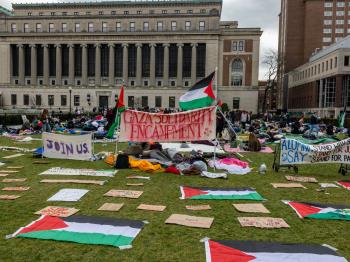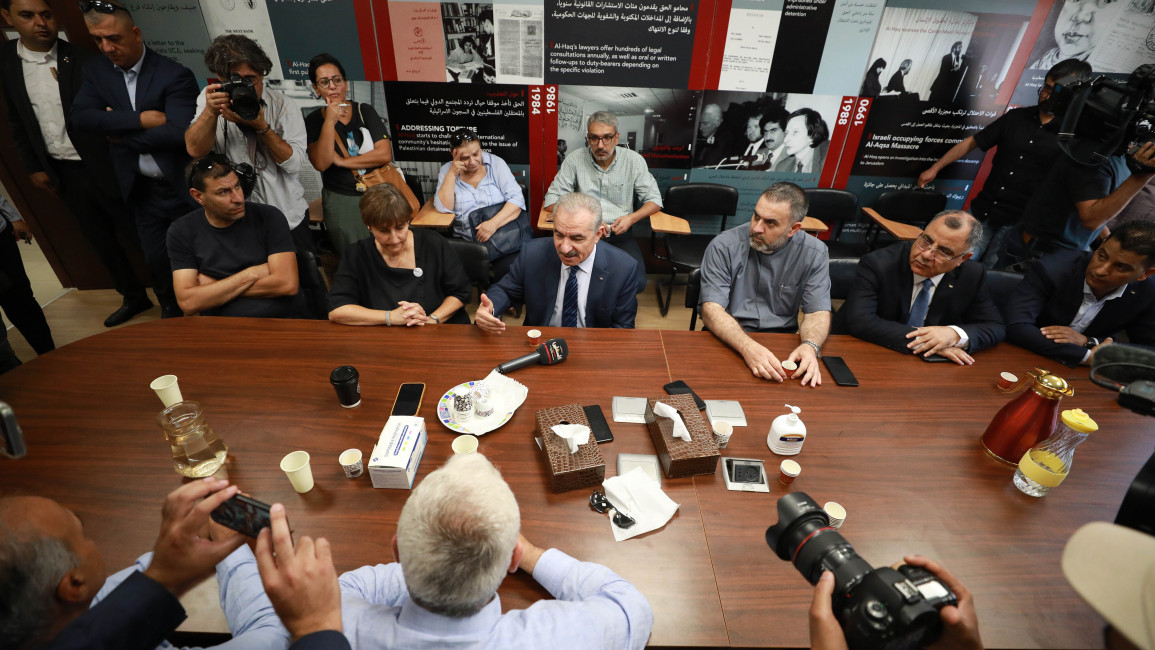Alwaght- The growing Israeli crimes against the Palestinians are not limited to killing, imprisonment, and blockades, and include obstruction of the work of the NGOs providing aids to improve life of millions of Palestinians suffering under occupation for decades.
As part of this policy, the Israeli forces on Thursday stormed headquarters of 7 Palestinian rights and legal organizations in Ramallah in the occupied West Bank under the ruse of their support to the Palestinian anti-occupation groups. The raids followed remarks by the Israeli Defense Minister Benny Gantz who said that four Palestinian civil organizations, Al-Dhamir, Bissan, and General Union of Palestinian Women (GUPW), and Al-Haq are "terrorists." the Israeli occupation forces removed the office stuff and seized files of the GUPW.
The raid targeted and closed down Al-Haq society, Adamir prisoner rights institute, Bisan research and development center, the Defense for Children International-Palestine, Palestinian Agricultural Relief Committees (PARC), GUPW, and Health Work Commitees.
The Israeli authorities said that a number of those organizations had links to Palestinian Liberation Front, a claim they rejected. They call these actions part of the repression that has been going on for decades against political activists in the occupied territories.
Activities of Palestinian rights organizations
Contrary to the Israeli claims, most of the organizations that were targeted record the human rights violations of the Israeli regime. For example, Al-Haq, one of the most well-known NGOs active in the West Bank, has been documenting human rights violations by the Israeli forces since the 1970s. Also, PARC is trying to rehabilitate the lands at risk of confiscation by the Israeli regime in 'Area C' of the West Bank, which is under direct occupation. Adamir organization was founded in 1991 and provides free legal representation to Palestinian political prisoners held in Israeli prisons. Defense for Children International-Palestine provides free legal aid to Palestinian children who are detained and prosecuted in the military courts. The group is known for its success in limiting the length of time children are held in Israeli prisons and publishes key reports and information on the status of Palestinian children in prisons. GUPW was established in 1980 to empower Palestinian women at all levels and contributes to the national struggle of Palestinians against the illegal occupation of Palestinian lands by the Israeli forces. Bisan legal organization was established in 1989 and cooperates with youths, workers, poor communities, and women to achieve their economic and social rights.
Tel Aviv is pushing to label "terrorist" the Palestinian human rights institutions and prevent their activities so that reports of its crimes are not sent to international organizations. A look at the activities of the civil organizations that were raided by the Israeli forces reveals that they are a big obstacle in the path of the Israeli occupation, and continuation of their activity in the current situation could work against Israel. Actually, the more Israeli crimes are reflected in the world, the more would be the world public anger and aversion to the Israeli regime. The issue at a time the Israelis are trying to normalize their relations with the Arab countries can prove costly. Bracing force a large-scale military campaign in the West Bank, Tel Aviv wants to policize the political and social atmosphere in the occupied territories and silence any opposition voice.
A history of NGOs in Palestine
In 1948, the Palestinians lost 78 percent of their homeland. What remained were two non-contiguous regions, including the West Bank, which constituted 22 percent of the original area at that time, and the Gaza Strip, which accounts to 1 percent of the original area.
Since then and during decades of occupation, the scale of humanitarian tragedy grew broader. Nearly 1 million Palestinians were displaced overnight, 350,000 moving to the West Bank and 250,000 to the tiny Gaza Strip. Hundreds of thousands left the occupied territories to neighboring Egypt, Syria, and Jordan, with many of them living a life of penury and in desperate need of humanitarian aids. A majority of those lost their homes were illiterate farmers and depending on land as their only source of living.
In the absence of a government supporting the Palestinian community by providing services to the people, Palestinian NGOs that have been providing social services since 1948 have grown and new ones emerged.
As a result of this history of conflict, refugees crisis, and occupation, today more than 500 Palestinian non-governmental organizations operate in the West Bank and Gaza and are engaged in providing basic social services.
In the 1990s, the World Bank renewed its commitment to poverty relief in developing countries. Concerning Palestine, Palestinian NGO Network (PNGO) as a poverty alleviation initiative was established in 1997.
Reactions to Israeli crimes
The Israeli raid on the Palestinian NGOs drew reactions from Palestinians and world community.
The General Director of Al-Haq Shawan Jabarin noted that the Israeli security claims about the activities of these organizations are false and "according to the Palestinian law, we demand the Israelis to prove their claims about terrorist activities."
The executive secretary of the Palestinian Liberation Organization warned that closing down NGOs was a dangerous escalation to "silence the voice of the truth and justice."
The Office of the United Nations High Commissioner for Human Rights described the labeling of these seven institutions as terrorists — six of which belonging to human rights groups— as a cause for concern and stated that the deplorable act of blacklisting these civil organizations lacks valid evidence.
A number of other human rights organizations, including the UN Human Rights Watch and Amnesty International, panned the raid. Additionally, the Palestinian Authority said the blacklisting decision is a "clear crime and violation of the rights of Palestinian civil organizations as well as violation of the entire international legal system." Also so reacting to the Israeli hostility, Democracy for the Arab World Now (DAWN) announced in a statement that the Israeli occupation did not provide any reasons for this action to support its move, therefore "no country in the world supports this decision."
Amid the waves of global anti-Israeli condemnations, the US government, a constant supporter of the Israeli crimes, this time, too, stopped short of serious condemnation and only expressed concerns, calling on Tel Aviv to provide further information to Washington.
Fear of resistance
The Israeli raid comes two weeks after a three-day war between Israel military and Islamic Jihad Movement, with Israeli airstrikes killing a number of children and women, followed by calls from the European Union and rights organizations for an investigation into Israeli war crimes in Gaza. So, Tel Aviv intends to prevent its crimes revelations on the international stage by shutting down the human rights advocacy offices.
The storming of the rights organizations' offices marks a new page in a long history of crimes by a regime even intolerant of voices supporting the rights of the Palestinians and calling for end to over seven decades of apartheid occupation that withholds the most basic human rights. The Palestinian rights have been violated by the Israeli occupation for nearly eight decades, and during this time, the Palestinians have been subjected to various crimes. The Israelis have grown so arrogant they even do not show mercy with human rights entities. Despite Israeli pro-rights rhetoric, the raid showed that they even fear the Palestinian civil voices.



























